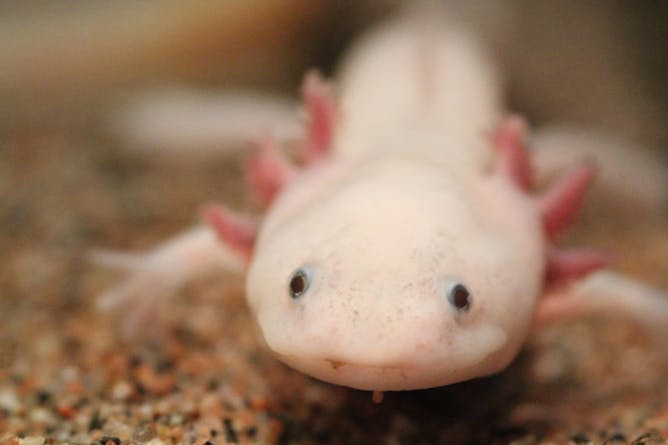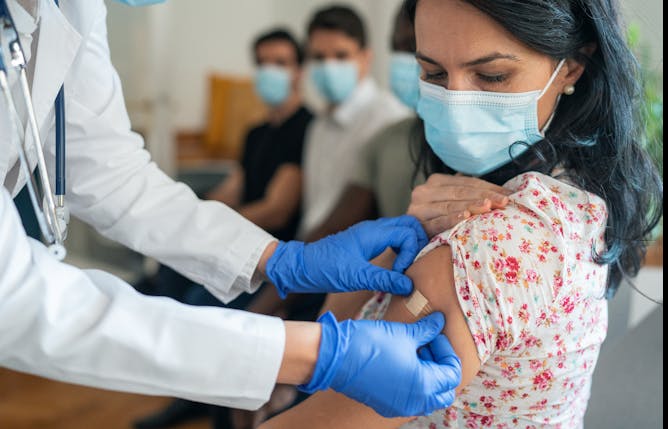|
A small aquatic salamander known as the axolotl has long fascinated scientists because of its ability to regenerate brain cells. In a study published last week, researchers built an atlas of part of the axolotl brain to help compare it with other species and gain insight into treating brain diseases in people. “Examining the genes and cell types that allow axolotls to accomplish nearly perfect regeneration may be the key to improve treatments for severe injuries and unlock regeneration potential in humans,” writes researcher Ashley Maynard.
These days we’re all taught to be very careful not to get too much sun exposure, but our prehistoric ancestors were well-adapted to spending all day in the sun and didn’t need to concern themselves with skin protection, writes Penn State biological anthropologist Nina Jablonski. Her research into the evolution of skin pigmentation shows that people’s “skin adapted to subtle, seasonal changes in sunlight and UV conditions.” The article also traces the development of methods to protect skin with the advent of farming and food storage as people spent more time inside.
With an upcoming work trip for the first time in over two years, my first order of business this week was getting the latest COVID-19 booster, which was recently authorized for use. Immunologists Prakash Nagarkatti and Mitzi Nagarkatti from the University of South Carolina provide some insight into how these bivalent vaccines – meaning, they’re designed to protect against both the original coronavirus and the omicron variant – were developed, and what these new vaccines show about the flexibility and speed of mRNA vaccine technology.
Also in this week’s science news:
If there’s a subject you’d like our team of science editors to investigate, please reply to this email.
|

Axolotls are a model organism researchers use to study a variety of topics in biology.
Ruben Undheim/Flickr
Ashley Maynard, Swiss Federal Institute of Technology Zurich
Axolotls are amphibians known for their ability to regrow their organs, including their brains. New research clarifies their regeneration process.
|

The sun’s rays often feel good on your skin, but can cause serious damage.
Maksim Chernyshev/EyeEm via Getty Images
Nina G. Jablonski, Penn State
Our ancient ancestors didn’t have clothes or houses – but that constant exposure to the sun helped their skin protect itself from the worst sun damage.
|

In a matter of days, eligible people will be lining up to receive the newly formulated booster shot.
filadendron/E+ via Getty Images
Prakash Nagarkatti, University of South Carolina; Mitzi Nagarkatti, University of South Carolina
The CDC’s endorsement of the reformulated COVID-19 booster shots represents a major step in the effort to get more Americans boosted.
|
|
|
-
Quinn Hirschi, University of Chicago
The common advice to let the other person talk more might backfire if you want to make a positive first impression.
-
Rosemary Rochford, University of Colorado Anschutz Medical Campus
Health officials say the new case of polio in New York state and the presence of poliovirus in the municipal wastewater suggests that hundreds more could already be infected with the disease.
-
Kathryn Kavanagh, UMass Dartmouth
Human embryos are far more likely to die than come to term, an evolutionary trait seen across species. Laws granting personhood at conception ignore built-in embryo loss, with potentially grave consequences.
-
Michael Heithaus, Florida International University
Just about every creature on Earth needs to grab some Zs from time to time. Imagine trying to doze while dodging great whites and killer whales.
-
Wil Srubar, University of Colorado Boulder
Cement is responsible for more than 8% of global greenhouse gas emissions. Its emissions doubled over the past two decades, and demand is still rising fast.
-
Tom Langen, Clarkson University
Satellite telemetry, tiny geolocation tags and passive acoustic recording are providing new insights into bird migration and vital data for conservation.
-
Ayonga Hereid, The Ohio State University
Videos of humanoid robots dancing and performing backflips in the lab notwithstanding, robots that wash your dishes and fold your laundry are still years away. A roboticist explains why.
|
|